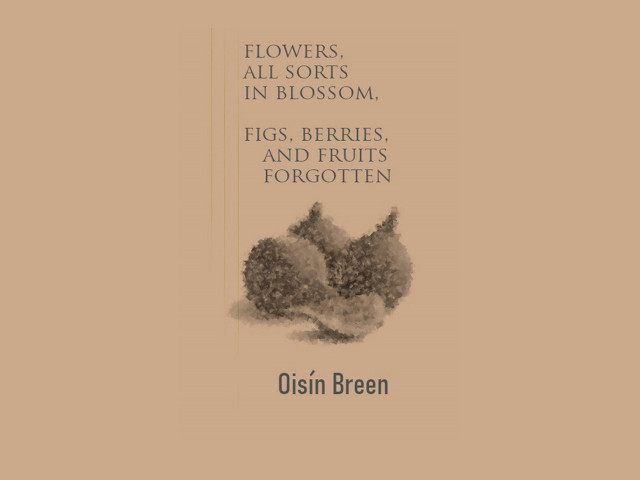Lawrence Illsley reviews Oisín Breen’s book of poetry,
Gods and mortals, past and present, hustle and collide in ‘Flowers, All Sorts in Blossom, Figs, Berries, and Fruits Forgotten’ By Oisín Breen.
Don’t be misled by the title of Oisín Breen’s far-ranging elegy for his father, a triptych of long poems taking us through grief’s chaotic journey to acceptance. The pastoral mood and gentle rhyme of the title are rarely found within this complex, free-verse poem where voices and language collide and shift, like the time and space of Breen’s grief. The title instead feels almost like an epitaph, something carved upon a mossy granite gravestone, whereas the complex multi-layered poems beneath the title feel like the complex, multi-layered person Breen is remembering.
The first of the three poems take the form of a question. ‘Isn’t the act of placing flowers on a tomb a gesture of bringing a little life back to the dead?’ Breen attempts to answer this question directly in the text, whilst indirectly animating his father with the words he writes on the page. He finishes this act of reconstruction certain, as we are, that he has succeeded. The final line of the poem turns the question into a statement. ‘Placing flowers on a tomb is a gesture of bringing life to the dead.’ (My italics) But it is not an easy victory, to get there he must get through tough times.
‘REMINISCE THEN IS THE CHARRING OF THE MOORLAND BY
INCESSANT HEAT.
IT IS THE LIMP NECK OF THE PIOUS GROUSE,
THE TRILLING NASAL SCRAWL OF ITS GRIEFBLIND MATE,
IT IS THE SNAPPED TETHER,
A SCHOONER GUIDED BY LEYLINES AND CAST ENTRAILS,
A TRANSUBSTANTIATED EUCHARIST OF THE INCHOATE’
Breen clearly does not find the experience of memory easy and his writing bites with the struggle, these are indeed ‘lines of brutal song.’ Yet, despite these exhortations, the most powerful word of the first poem is the middle English word for silence, ‘whist’ – the root of the modern wistful. In Breen’s hands, the breathy, aerated vowels, sounding like wind in the branches, soothe the reader and remind, rather than command them that it is perhaps only when alone and silent that we can come to terms with death.
This appearance of the word whist, is the first intimation of a Gaelic heritage to the poem, the first real indication of place. Despite this, in the first poem, Breen does not want us to settle in one place or time and continually keeps moving, worlds colliding through his words. There are old words like keening and victuals; Gaelic words – grá, Förum í víkingéger þyrstur, modern words like bifurcated, giddy, gravel, concrete. Ancient names exist alongside the modern. The seer Asipû, King Sennacherib, Christ and Mnemosyne co-exist with ‘ gods with polyethylene skin’ and ‘junkies’ and so-called gods like Harry Wasylyk, inventor of the disposable bin liner, Edison and Rita Heyworth.
The first appearance of the Gods, especially Adad and Begab from such remote places like Mesopotamia, disrupts the temporal location of the poem and separates us from located space. I sense that Breen may be trying here to hint at the similar disruptions grief causes to our lives. Nevertheless, the mention of such ancient sources does immediately serve to connect this essentially modern, free-verse poem, to the tradition of the metred line, to the Mesopotamia of Byron and the elegy of Tennyson. It is here that we understand the hints of classicalism of the title. They are the first clue to help understand this poem – to understand the links between the past and the present that can exist within one person.
Yet, despite the poem’s flirtation with atemporality and transcontinental travel, Breen is drawn, almost inevitably to Ireland, to the ‘Wexford caravan park.’ of some half-remembered childhood, or another, more distant past.
Cnoc Uisnigh — her red hair for Conochobar of the reeds — when
she is old enough we’ll — with raven’s colours — Naoise, Ardan and
Ainnle pinioned by a spear
For me, Breen is at his strongest when located, when telling us a story. ‘I am making toast covered in chilli flakes and cheese in the grill,’ he says and I am there with him. For all the movements through time and space and all the different voices, it is these stories that the poems hang on.
Once, aged 17, I drank from a bladder-pelt of cider, while turning in
circles with my friend’s mother, and she was lovestruck with the sickly
sweetness of her son’s menagerie, though she, and fitfully all of us, knew
that we’d more likely have the gutterslung luck of the dead in us than for
this to be more than just a procession of moments in a broken nest of
long lives of airbrushed memories, even if rare bonds there continued to
coalesce.
For this reason of location, the strongest of the three poems is perhaps the second, ‘Dublin and the Loose Footwork of Deity’. Here we are firmly located in Dublin, and this appears to free Breen as a poet. Empowered by the location, and confident from his conclusion to the first poem that acts of memory, like writing, do indeed bring the dead back to life, he gives voice to a crowd. I am tempted to see these poems as a sequence and here, it is as if his father, in all his multiplicities and guises, has become the city – an extended metaphor that really works. All of the disembodied voices of the first poem become characters. Dublin is peopled by gods and split personalities, Breen rifling through memories and invoking characters like ancient spirits.
Think again of the sun-split sky on the Beckett Bridge.
My city is a city of millions, and all of them mad.
My city, like you, is alive.
The third poem, ‘Her Cross Carried, Burnt’ is softer – is a song. It begins
The flowers they are fallen,
The fruit it is rotten,
But your grave is as pretty as ever.
Each year I sing this better.
Three lines. One song.
I incant.
The important word here is cant, as in to sing, but also used by Breen as ‘incant’, and then later ‘recant.’ Here, the previous certainty is gone but is replaced by reflection. It is as if the poet is coming to terms with his grief, as if, as he says
‘in making there’s melody,
in melody order,’
In this third poem the journey seems finally complete, not with the desperate knowledge or false certainty that ended the first poem – where in fact the journey was just beginning – but instead with acceptance. There are no chorus of gods here just ‘the one holy, axiomatic God’ existing alongside the Id and mathematics and song. And it is through this forming and reforming of song
‘THE MELODY PLUCKED SO AS IT CAN BE REASSEMBLED.’
that the poet finds his most profound conclusion of all – that life must be constantly assembled, destroyed and reassembled if we are to live and thrive. Appropriately he talks of music and form, the form of the poetry standing in for the forms of life. And it is Breen’s chosen modern, free-verse form which shows us this conclusion from the very beginning, as if somehow the poetry knew the answer before the writer themselves understood it.
Throughout the book, it is song that holds the poems together as a coherent whole, allowing the long-form to do its work and take us the reader on a journey below the surface, towards the complex, contradictory emotions of life and death, but, in the end it is in silence, the whist, the white gap of the page between Breen’s carefully placed lines where reflection is possible and where the heart of these poems reside.
You can purchase ‘Flowers, All Sorts in Blossom, Figs, Berries, and Fruits Forgotten’ here

